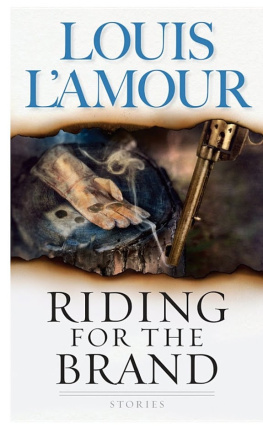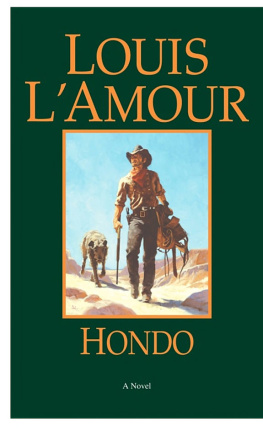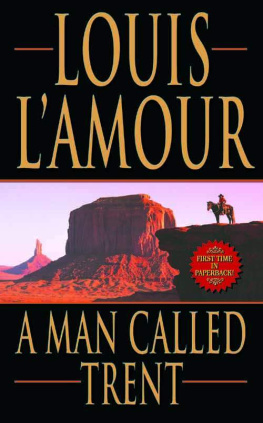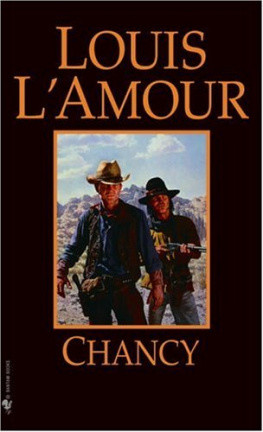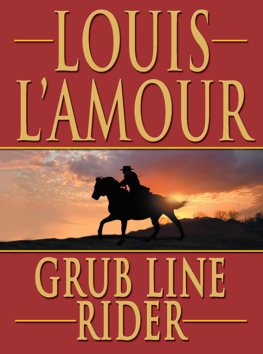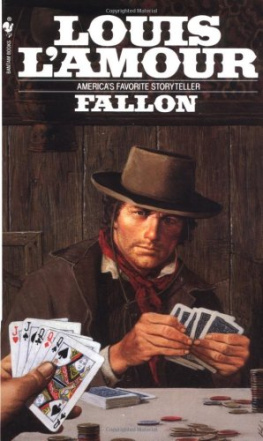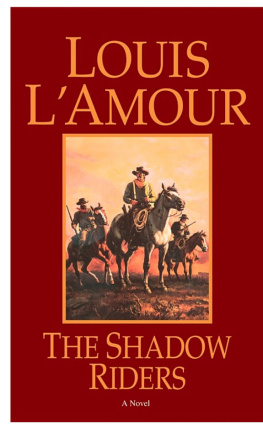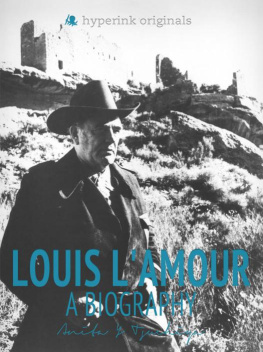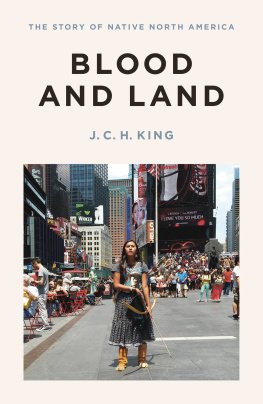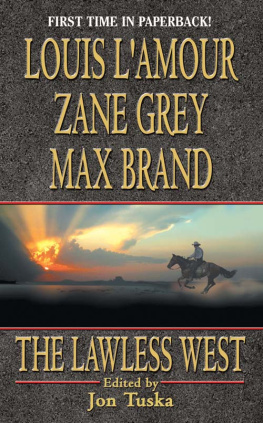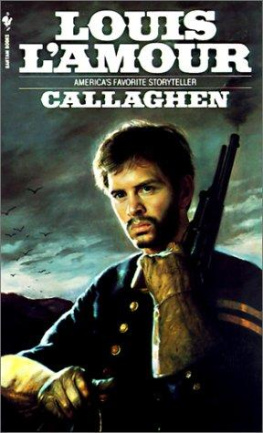Riding for the Brand (Ss) (1986)
L'amour, Louis
Riding For The Brand
Louis L'amour
*
The open West was a land where wanderers could find themselves a home a home to fight for, to be changed by, sometimes to die for.
Jed Asbury was one such journeyman, taking on the identity of a dead man. Allen Ring was another: he'd won his plot of land in a card game, only to find that he had to win it again with a gun. From a has-been boxer to a ranch hand taking on his bosses troubles, the characters in these classic Louis L'Amour stories are all "riding for the brand" staying loyal to what matters, staking the West with their courage and their blood.
*
RIDING FOR THE BRAND
The term "riding for the brand" was an expression of loyalty to a man's employer or the particular outfit he rode for. It was considered a compliment of the highest order in an almost feudal society. If a man did not like a ranch or the way they conducted their affairs he was free to quit, and many did, but if he stayed on he gave loyalty and expected it.
A man was rarely judged by his past, only by his actions. Many a man who came west left things behind him he would rather forget, so it was not the custom to ask questions. Much was forgiven if a man had courage and integrity and if he did his job. If a man gave less than his best, somebody always had to take up the slack, and he was not admired. Riding for-the Brand He had been watching the covered wagon for more than an hour. There had been no movement, no sound. The bodies of the two animals that had drawn the wagon lay in the grass, plainly visible. Farther away, almost a mile away, stood a lone buffalo bull, black against the gray distance.
Nothing moved near the wagon, but Jed Asbury had lived too long in Indian country to risk his scalp on appearances, and he knew an Indian could lie ghost-still for hours on end. He had no intention of taking such a chance, stark naked and without weapons.
Two days before he had been stripped to the hide by Indians and forced to run the gauntlet, but he had run better than they had expected and had escaped with only a few minor wounds.
Now, miles away, he had reached the limit of his endurance. Despite little water and less food he was still in traveling condition except for his feet. They were lacerated and swollen, caked with dried blood.
Warily, he started forward, taking advantage of every bit of cover and moving steadily toward the wagon. When he was within fifty feet he settled down in the grass to study the situation.
This was the scene of an attack. Evidently the wagon had been alone, and the bodies of two men and a woman lay stretched on the grass.
Clothing, papers, and cooking utensils were scattered, evidence of a hasty looting. Whatever had been the dreams of these people they were ended now, another sacrifice to the westward march of empire. And the dead would not begrudge him what he needed.
Rising from the grass he went cautiously to the wagon, a tall, powerfully muscled young man, unshaven and untrimmed.
He avoided the bodies. Oddly, they were not mutilated, which was unusual, and the men still wore their boots. As a last resort he would take a pair for himself. First, he must examine the wagon.
If Indians had looted the wagon they had done so hurriedly, for the interior of the wagon was in the wildest state of confusion. In the bottom of a trunk he found a fine black broadcloth suit as well as a new pair of hand-tooled leather boots, a woolen shirt, and several white shirts.
"Somebody's Sunday-go-to-meetin" outfit," he muttered. "Hadn't better try the boots on the way my feet are swollen."
He found clean underwear and dressed, putting on some rougher clothes that he found in the same chest. When he was dressed enough to protect him from the sun he took water from a half-empty barrel on the side of the wagon and bathed his feet; then he bandaged them with strips of white cloth tom from a dress.
His feet felt much better, and as the boots were a size larger than he usually wore, he tried them.
There was some discomfort, but he could wear them.
With a shovel tied to the wagon's side he dug a grave and buried the three side by side, covered them with quilts from the wagon, filled in the earth, and piled stones over the grave. Then, hat in hand, he recited the Twenty-Third Psalm.
The savages or whoever had killed them had made only a hasty search, so now he went to the wagon to find whatever might be useful to him or might inform him as to the identity of the dead.
There were some legal papers, a will, and a handful of letters. Putting these to one side with a poncho he found, he spotted a sewing basket.
Remembering his grandmother's habits he emptied out the needles and thread and under the padded bottom of the basket he found a large sealed envelope.
Ripping it open he grunted with satisfaction.
Wrapped in carefully folded tissue paper were twenty twenty-dollar gold pieces. Pocketing them, he delved deeper into the trunk. He found more carefully folded clothes. Several times he broke off his searching of the wagon to survey the country about, but saw nothing. The wagon was in a concealed situation where a rider might have passed within a few yards and not seen it.
He seemed to have approached from the only angle from which it was visible.
In the very bottom of the trunk he struck paydirt. He found a steel box. With a pick he forced it open. Inside, on folded velvet, lay magnificent set of pistols, silver plated and beautifully engraved, with pearl handles. Wrapped in a towel nearby he found a pair of black leather cartridge belts and twin holsters. With them was a sack of .44 cartridges. Promptly, he loaded the guns and then stuffed the loops of both cartridge belts. After that he tried the balance of the guns.
The rest of the cartridges he dropped into his pockets.
In another fold of the cloth he found a pearl-handled knife of beautifully tempered steel, a Spanish fighting knife and a beautiful piece of work. He slung the scabbard around his neck with the haft just below his collar.
Getting his new possessions together he made a pack of the clothing inside the poncho and used string to make a backpack of it. In the inside pocket of the coat he stowed the legal papers and the letters. In his hip pocket he stuffed a small leather-bound book he found among the scattered contents of the wagon. He read little, but knew the value of a good book.
He had had three years of intermittent schooling, learning to read, write, and cipher a little.
There was a canteen and he filled it. Rummaging in the wagon he found the grub box almost empty, a little coffee, some moldy bread, and nothing else useful. He took the coffee, a small pot, and a tin cup. Then he glanced at the sun and started away.
Jed Asbury was accustomed to fending for himself. That there could be anything wrong in appropriating what he had found never entered his head, nor would it have entered the head of any other man at the time. Life was hard, and one lived as best one might. If the dead had any heirs, there would be a clue in the letters or the will. He would pay them when he could. No man would begrudge him taking what was needed to survive, but to repay the debt incurred was a foregone conclusion.
Jed had been born on an Ohio farm, his parents dying when he was ten years old. He had been sent to a crabbed uncle living in a Maine fishing village. For three years his uncle worked him like a slave, sending him out on the Banks with a fishing boat. Finally, Jed had abandoned the boat, deep-sea fishing, and his uncle.
He walked to Boston and by devious methods reached Philadelphia. He had run errands, worked in a mill, and then gotten a job as a printer's devil. He had grown to like a man who came often to the shop, a quiet man with dark hair and large gray eyes, his head curiously wide across the temples. The man wrote stories and literary criticism and occasionally loaned Jed books to read. His name was Edgar Poe and he was reported to be the foster son of John Allan, said to be the richest man in Virginia.

